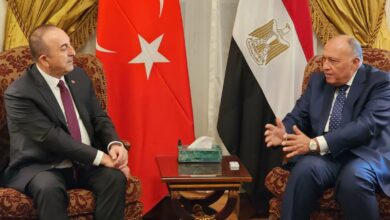Brussels — NATO failed again to agree on Wednesday on taking over command of military operations against Muammar Qadhafi's forces in Libya from the United States, chiefly due to Turkish reservations, diplomats said.
After ambassadors of the 28-nation alliance ended a third day of wrangling in Brussels without a deal, one senior NATO diplomat said: "No decision on anything."
Turkey, a Muslim ally, said it did not want NATO to take responsibility for offensive operations that could cause civilian casualties or be in charge of enforcing a UN-mandated no-fly zone while coalition aircraft were simultaneously bombing Libyan forces.
"It would be impossible for us to share responsibility in an operation that some authorities have described as a 'crusade'," Turkish Foreign Minister Ahmet Davutoglu told reporters in Ankara. Russian Prime Minister Vladimir Putin has used that term, as has Qadhafi.
"It's important that the effort be gathered under one umbrella, and we will continue to negotiate until we achieve this. No one should make this out as Turkey is trying to block efforts, this is wrong…It may be a long night, but we will continue talks until Turkey's concerns are put to rest," Davutoglu said.
A Turkish diplomat said talks would continue Thursday. One NATO source said Turkey wanted Western coalition countries to finish their air strikes before NATO took over command, so the alliance was not blamed for any accidents.
Another source said the United States had wanted to transfer command to the alliance Saturday, a week after the start of operations, but that was likely to slip since NATO would need 72 hours to put the decision into practice.
After four nights of air strikes, Gaddafi remained defiant, vowing that Western powers engaged in military action in Libya would "end up in the dustbin of history."
POLITICAL DRESSING
Washington, London and Paris agreed Tuesday that the alliance should play a key operational role, but the assent of all 28 NATO states is needed and they have also been split over whether NATO should exercise political control.
"It's all about how you dress this up politically," a NATO source familiar with the negotiations said.
Turkey says the air campaign has already gone beyond the scope of last week's UN Security Council resolution.
However, Brigadier Pierre Saint-Amand of NATO's military staff, told a media briefing Turkey was sending five warships and a submarine to join a separate NATO operation off Libya to enforce a UN arms embargo.
France, which launched the air campaign against Libya with Britain and the United States Saturday, argues that having the US-led NATO in charge would erode Arab support because of the alliance's unpopularity in the Arab world.
French Foreign Minister Alain Juppe said representatives of the countries taking part in the coalition, plus the African Union, the Arab League and associated European countries, would hold a "contact group" meeting in London next Tuesday. That would give Arab partners a share in the political leadership.
Qatar has sent four warplanes, the United Arab Emirates has offered support, and British Prime Minister David Cameron said Kuwait and Jordan had agreed to make logistical contributions to protect civilians in Libya.
READY IF REQUIRED
NATO agreed Tuesday to enforce the arms embargo and completed plans to enforce the no-fly zone if needed, but has yet to make a decision on whether to implement the latter.
France wants an ad hoc steering group of coalition members, including the Arab League, to exercise political control.
One possible model would be the NATO-led International Peace Assistance Force (ISAF) in Afghanistan, in which non-NATO participants get a seat in the political steering group.
"For reasons of efficiency, we want a single command structure to run the coalition action, and NATO has such capabilities, so we must use its resources," French government spokesman Francois Baroin said after a cabinet meeting in Paris.
"We are working to ensure that the coalition continues to retain the political leadership," Baroin said. "Talks with our allies are being finalized. It's not quite nailed down yet."
The United States, Britain, Italy and Norway all want NATO's council of ambassadors in charge of policy.
A European diplomat said the French position appeared to have softened following consultations between President Nicolas Sarkozy, Cameron and US President Barack Obama overnight that could make a political deal possible.
Obama, under domestic pressure to limit US involvement, said Tuesday he had "absolutely no doubt" a deal would be reached soon.
The question of handing over leadership of the Libya mission is crucial for Obama, who has stressed limited US involvement to both voters and lawmakers worried about getting tied down in another Muslim country in addition to Iraq and Afghanistan.




